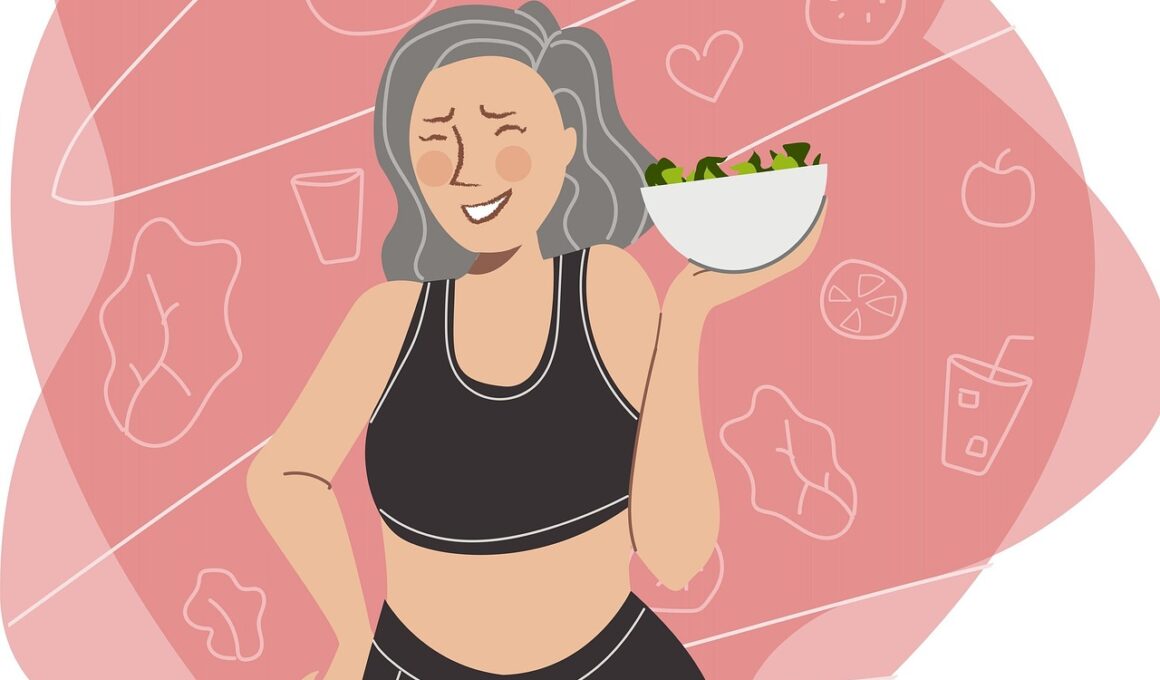Pre-Workout Nutrition Tips for Weight Loss
There’s a significant misconception regarding pre-workout nutrition that it must entail copious amounts of food. Many individuals believe that in order to have sufficient energy for an exercise session, they must consume substantial meals beforehand. This myth often leads to serious overeating. In reality, proper pre-workout nutrition focuses more on the timing of food intake rather than sheer quantity. Eating small, balanced snacks can provide the energy needed for effective workouts without overwhelming the digestive system. Ideal pre-workout snacks include foods rich in carbohydrates and proteins, such as bananas or Greek yogurt, which are easily digestible. Following these strategies helps maintain energy levels, executing exercises proficiently and effectively. Just as importantly, keeping portions moderate helps to avoid feelings of sluggishness during workouts. Additionally, hydration cannot be overlooked, as water intake boosts overall performance. Pre-workout nutrition is unique to each individual, emphasizing personal energy needs and preferences while also encouraging mindful eating habits. With a refined focus on these simple yet vital principles, one may experience improved workouts and, ultimately, success in weight loss goals.
Another prevalent myth regarding pre-workout nutrition is that you must eat protein-rich foods just before working out for muscle growth. This is not entirely accurate, as appropriate protein timing can often be managed throughout the day rather than solely immediately before exercise. Research indicates that post-workout nutrition is just as, if not more, critical than pre-workout nourishment in helping repair and replenish muscles. For strength training or bodybuilding, aim to consume protein sources that align with your overall daily intake strategies. Incorporating sufficient protein in daily meals supports muscle growth adequately without the need for pre-workout protein spikes. Thus, timing becomes more flexible, allowing for energy-giving carbohydrates before an intense workout while saving protein consumption closer to the workout’s end. Also, nutrient absorption capabilities differ from person to person; thus, understanding your body’s performance can guide you in customizing a personalized plan. One should focus on functioning and restoring energy levels first; subsequently, protein can be adjusted to improve recovery. Hence, the idea of chugging protein shakes before every workout may be another myth, emphasizing the significance of balanced meal consumption.
Understanding Carbohydrates and Fats
Many individuals view carbohydrates as detrimental to weight loss when they should instead recognize their essential role in pre-workout nutrition. There’s a common myth that eating carbs before working out will inevitably hinder weight loss progress, but this is misleading. In reality, carbohydrates serve as the primary energy source for our bodies, especially during high-intensity workouts. Consuming a small, carbohydrate-rich snack in the form of whole grains, fruits, or even oatmeal before exercising can lead to improved performance, sustaining energy throughout the entire workout. Moreover, fats should not be vilified; healthy fats such as avocado or nuts can provide lasting energy for longer workouts. The body requires enough energy to perform efficiently when exercising, which can be attained through the right approach to carbs and fats. Shunning carbs entirely can lead to inadequate energy levels, causing fatigue and decreased performance. Instead, incorporating moderate amounts of carbs and healthy fats can be beneficial, making workouts more manageable and enjoyable while supporting weight loss goals. A versatile approach that allows for these essential nutrients can help navigate the myths surrounding pre-workout nutrition effectively.
Another misconception is that eating right before a workout will cause stomach discomfort and negatively impact performance. It is important to clarify that the timing and type of food consumed before exercising plays a crucial role in how the body reacts. Eating too close to the workout can indeed lead to bloating or cramping, but allowing sufficient time for digestion can mitigate these issues. Typically, a window of about 30 to 90 minutes before exercise allows the body to process food efficiently. Eating lighter snacks, such as a piece of fruit or a small serving of yogurt, provides energy without compromising comfort during workouts. Personalized timing is essential, as each individual’s digestion rate varies. As a rule of thumb, it’s best to experiment with food choices and observe how your body responds during different workout intensities. Some individuals might benefit from a little nibble right before exercise, while others need more advanced planning. Ultimately, debunking this myth about pre-workout discomfort can guide athletes ready to fine-tune their nutrition choices.
Myth of Post-Workout Nutrition Necessity
Another myth prevalent among fitness enthusiasts is the belief that pre-workout nutrition must be mirrored exactly with corresponding post-workout eating to yield optimal results. While post-workout nutrition is indeed important for recovery, excess focus on consuming specific amounts of food immediately after exercising can lead to unnecessary stress and disconnection from natural hunger cues. It’s crucial to recognize that while refueling assists in muscle repair, the body’s nutritional needs are not solely confined to immediately after a workout. Balancing nutrient intake throughout the day can prove more beneficial, allowing focus on hydration, protein, and carbs whenever hunger signals emerge. If meals are planned effectively during the day, such anxiety regarding immediate post-exercise intake can lessen. Instead of rigid meal plans, general awareness of overall nutrient profile suffices, as sustained balance promotes effective recovery. Also, staying mindful can lead to satisfying cravings without undermining fitness goals. Thus, prevailing concepts tend to overemphasize post-workout nutrition aligned strictly with pre-workout strategies, when instead health-centered principles could serve better for overall performance and weight loss.
Yet another common misconception is that fasting prior to workouts burns more fat and ultimately enhances weight loss. While some believe that exercising on an empty stomach can lead to greater fat oxidation, recent studies show that this approach may not offer a significant advantage over maintaining a balanced diet. Exercising without sufficient nutrition can actually deprive your body of essential energy, leading to decreased performance levels and potentially overwhelming fatigue. Moreover, during workouts, your body requires fuel, meaning that fasting can prove detrimental in the long run by impairing workout intensity and effectiveness. Instead of fasting, opting for nutritious snacks pre-workout supports sustainable energy, allowing workouts to be more productive. To put it simply, fueling the body before exercise often enhances performance and provides effective muscle gains versus struggling through workouts while hungry. Thus, leaving behind the myth that fasting always leads to better workout results is essential in debunking misconceptions tied to pre-workout nutrition. Properly fueling the body enhances fitness routines while simultaneously supporting effective weight control.
Promoting Sustainable Eating Practices
Another prevailing myth is that pre-workout meals should always be consumed within a particular framework or formulated plan. This structured mindset can stifle flexibility in eating habits, leading to frustration and ultimately unhealthy relationships with food. Instead, it’s vital to promote intuitive eating, where the focus shifts to understanding personal hunger signals rather than strictly adhering to prescribed guidelines. Learning to appreciate food choices based on personal energy and recovery needs can support balanced nutrition while encouraging self-awareness. Portion control and nutrient-dense foods should become your primary focus, ensuring that pre-workout meals remain beneficial and enjoyable without forcing yourself into a pattern. Moreover, by individualizing pre-workout nutrition according to personal tastes and preferences, one can maintain a healthy approach to weight loss instead of relying on rigid diet strategies. Hence, fostering a flexible mindset allows sustaining a long-term lifestyle change while conducting effective workouts. Re-evaluating myths around pre-workout nutrition aligns better with healthy eating practices, benefiting your overall wellness journey and facilitating successful weight loss outcomes.
In conclusion, understanding the myths surrounding pre-workout nutrition can immensely impact an individual’s approach to fitness and wellness. By debunking misconceptions about meal timing, food types, and quantity, one can confidently move towards a more balanced and effective nutrition plan. It’s essential to remember that nutritional needs vary greatly among individuals, making personalized strategies far more advantageous. Focus on including nutrient-dense foods that offer energy before workouts while also allowing for recovery nourishment afterward. This simple shift in perspective enables enhanced energy levels and better workout performance, ultimately leading to more sustainable weight loss. Additionally, embracing intuitive eating practices can help foster a healthy relationship with food, moving away from rigid diets that can lead to negative habits. As you continue your fitness journey, prioritize your body’s hunger cues, thoughts, and refinements in your pre-workout meals to enhance overall health. The ultimate goal should be about integrating nutritious eating that supports your desired fitness outcomes without feeling constrained by myths. Through mindful practices and personalized approaches, achieving weight loss through effective, enjoyable workouts becomes a reality, making the transition towards a healthier lifestyle smoother.


